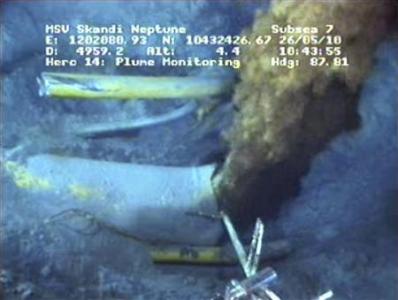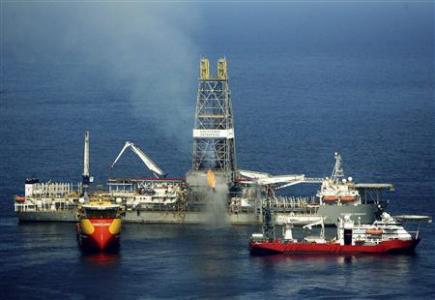BP says tricky deep-sea oil plug plan on track
HOUSTON (Reuters) - BP Plc said an ambitious deep-sea operation to choke off a gushing oil leak in the Gulf of Mexico was proceeding as planned on Wednesday, while President Barack Obama cautioned Americans there was no guarantee it would work.
BP is under intense pressure from Obama to bring a swift end to the five-week-old leak that threatens an environmental catastrophe and a blow to Obama's crisis-manager image.
Undersea robots were helping to inject heavy fluids and ultimately cement pumped down about a mile to the sea-bed well, while BP chief executive Tony Hayward and U.S. Energy Secretary Steven Chu monitored operations together in Houston.
"The operation is proceeding as we planned it," Hayward said in a media briefing four hours after launching the "top kill" strategy to stanch the leak.
"It will be another 24 hours before we know whether or not this has been successful," he added.
The embattled CEO stood by BP's 60-70 percent odds of success. But top kill, a routine procedure on the surface, has never been attempted at such depths, prompting one industry expert to put the odds of success at less than 50 percent.
"You have got some of the smartest guys in the business trying to figure this out, but it has never been done before," David Pursell, partner at Houston investment bank Tudor, Pickering, Holt & Co, told Reuters Insider.
"I think the odds have to be 50 percent or less," he added.
Obama said that if successful, BP's plan to cap the well should greatly reduce or eliminate the flow of hundreds of thousands of gallons (liters) of crude billowing into the Gulf.
If it fails, "there are other approaches that may be viable," he said on a trip to California.
Obama , who has told aides to "plug the damn hole," will head to Louisiana on Friday for the second time since the April 20 rig blast that killed 11 and unleashed the oil.
BP says the next approach would be to install a containment device over the broken blowout preventer, a structure at the top of the well on the ocean floor, to try to stop the oil flow. It would attempt this in the next three or four days.
It is still unclear how much oil is flowing from the well, but it is already shaping up to be the worst oil spill in U.S. history and a long-term threat to a rich ecosystem.
The oil's destruction of critical habitats continued to spread, with Louisiana Governor Bobby Jindal saying that more than 100 miles of the state's 400-mile coastline were now affected.
A BP statement said the top kill action began at 1 p.m. CST after the U.S. Coast Guard approved the operation, the most ambitious effort to date to cap the well.
PIVOTAL DAYS FOR OBAMA, BP
These days may be critical for the London-based energy giant and Obama.
BP's reputation and its big presence in the United States is at stake and investors, who have wiped $50 billion off BP's market value since the start of the spill, will watch closely to see whether the latest attempt to seal the well works.
BP shares seesawed in London trading, with investors boosting the share price about 2.6 percent at one point before it closed up 1.4 percent. BP's announcement that it had launched the new operation came after London markets had closed.
If the effort fails, Obama may have no choice but to take charge of the response. He has so far deflected calls for the government to take a more direct role and said BP has legal responsibility for fixing the mess.
What he can do is unclear because the government does not have its own deepwater tools and technology and will have to rely on BP.
But even with Obama applying constant pressure on the company, polls show that nearly half of Americans are unhappy with how he has handled it. That sentiment could play into the November elections that are widely expected to erode his Democratic Party's control of the U.S. Congress.
Florida Democratic Senator Bill Nelson said if BP failed to plug the leak this week, Obama must seize personal control of the effort immediately.
"If this thing doesn't work then the president ought to turn this over to the military. It has the command structure to bring in all the civilian agencies," said Nelson.
LOST COASTLINE EXASPERATES LOCALS
Residents of the Gulf region are particularly concerned about the impact of spreading oil on wildlife and area shorelines, home to a lucrative fishing and tourism business.
Billy Nungesser, president of Plaquemines Parish, one of the worst affected Louisiana coastal districts so far, sharply criticized BP executives and Coast Guard leaders, saying they had no comprehensive plan to defend the coast from the oil.
"We will lose more coastline from this catastrophe than from all four hurricanes -- Katrina, Rita, Gustav and Ike," said Nungesser.
Commercial fishing, shrimping and oyster harvests have been shut down for weeks along much of the Gulf coast, home to a $6.5 billion seafood industry.
BP said it had appointed an independent mediator to oversee damage claims. More than 26,000 claims have been submitted so far, resulting in payments of more than $36 million.
BP has estimated that about 5,000 barrels (210,000 gallons/795,000 liters) have been leaking every day, although some scientists have given much higher numbers for the size of the leak -- up to 20 times more.
The head of the National Oceanic and Atmospheric Administration, Jane Lubchenco, told a congressional hearing the National Oceanic and Atmospheric Administration would provide a new estimate within two weeks on the amount of oil leaking from the well.
"It's only been in the last couple of days that we have gotten video that was high enough resolution, long enough length and fast enough shutter speed to really do credible calculations," Lubchenco said.
(Additional reporting by Kristin Hays and Chris Baltimore in Houston, Pascal Fletcher in Miami, Susan Heavey and Tom Doggett in Washington; Jeff Mason in Fremont, California and Sarah Young in London, writing by Mary Milliken; editing by Philip Barbara)
© Thomson Reuters 2010 All rights reserved

=


